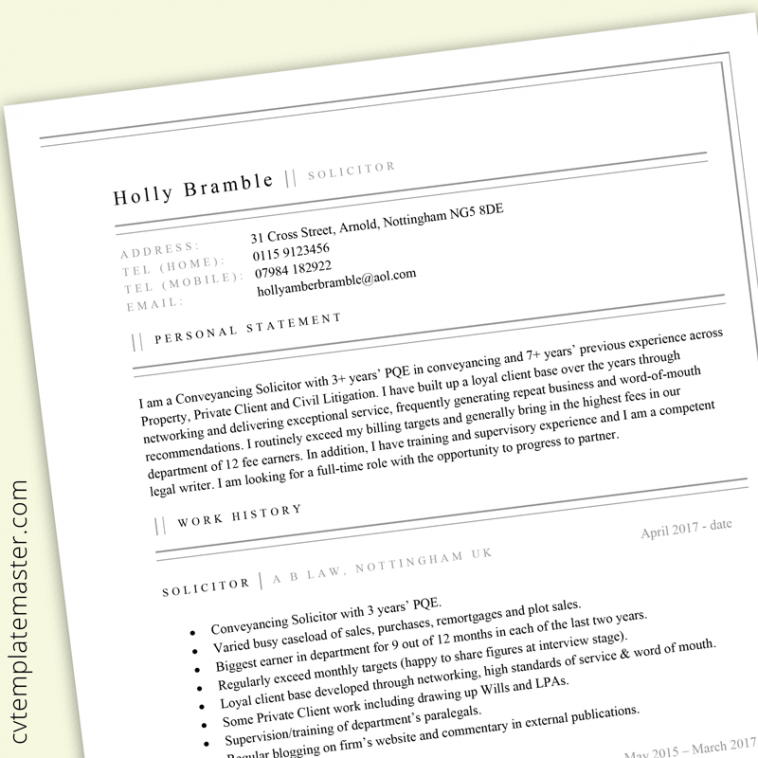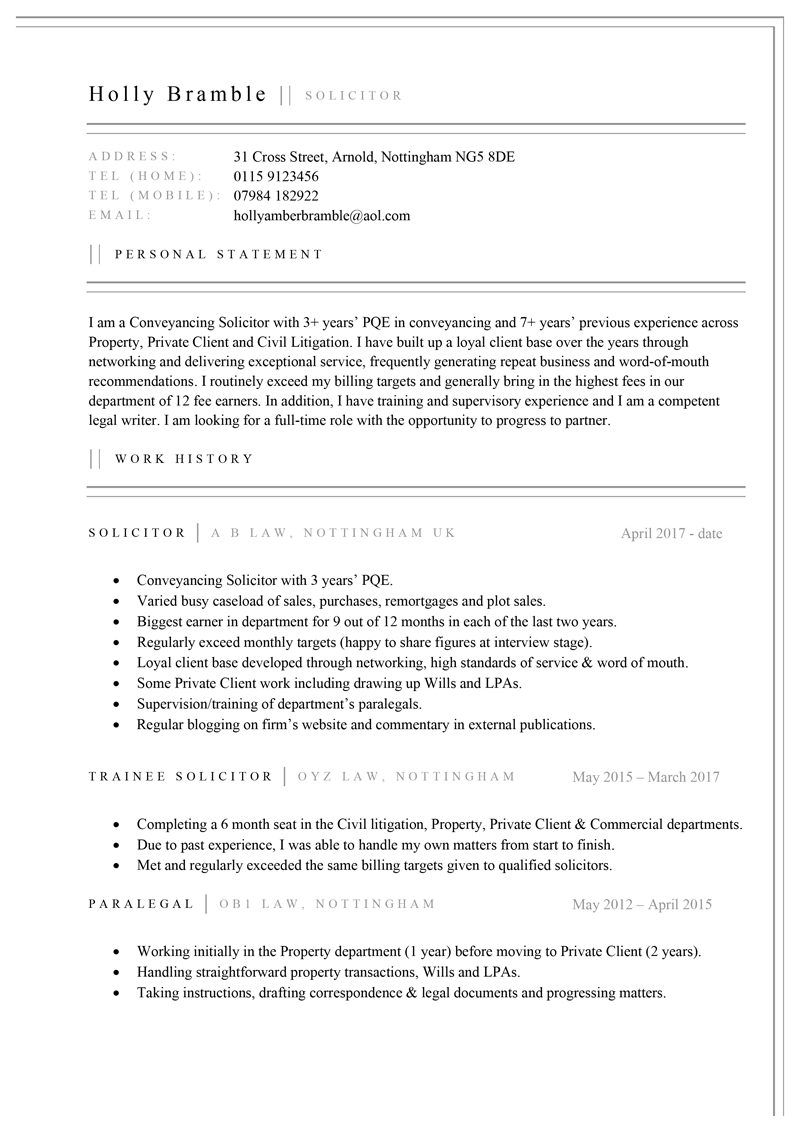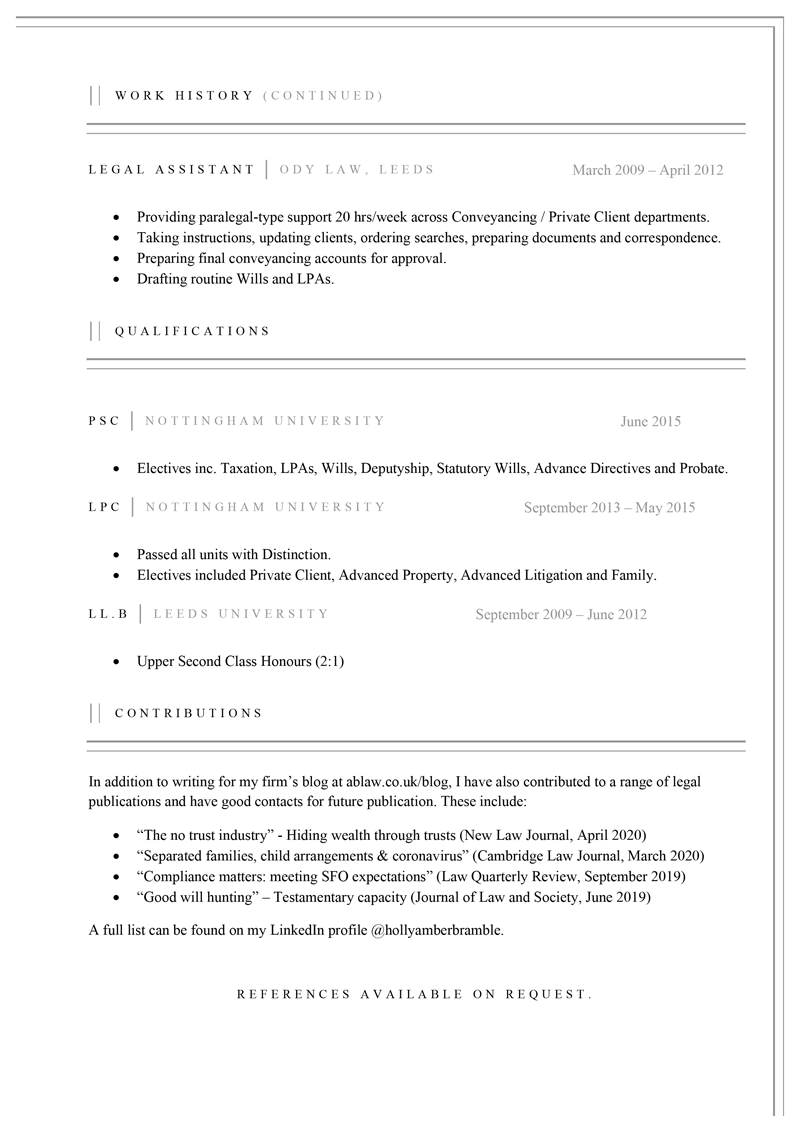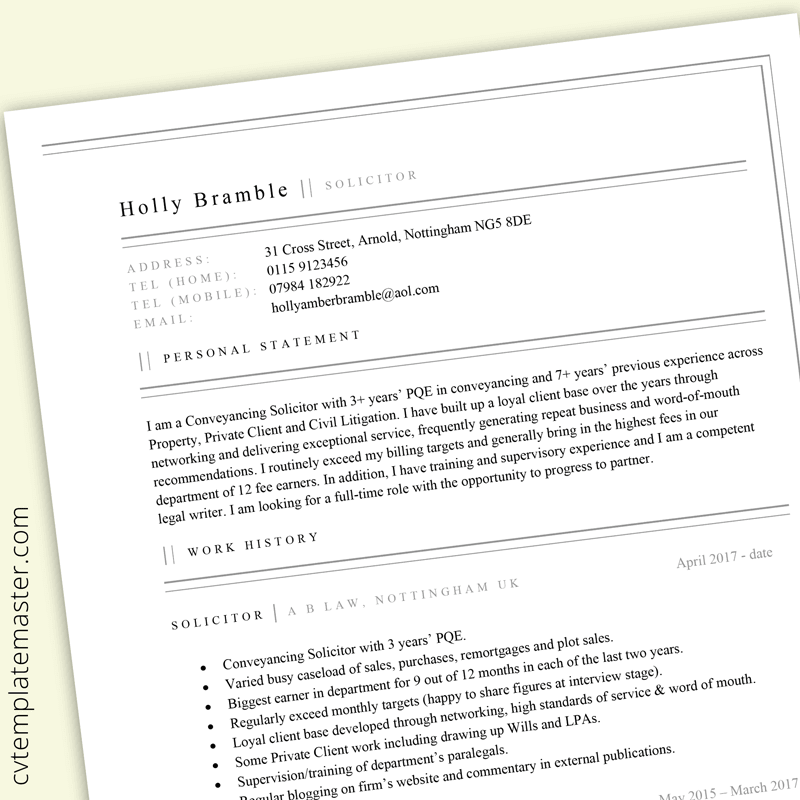Text preview of this CV template:
This is a text-only preview - download the formatted Word file using the link above.
Holly Bramble || SOLICITOR
ADDRESS: 31 Cross Street, Arnold, Nottingham NG5 8DE
TEL (HOME): 0115 9123456
TEL (MOBILE): 07984 182922
EMAIL: hollyamberbramble@aol.com
PERSONAL STATEMENT
I am a Conveyancing Solicitor with 3+ years’ PQE in conveyancing and 7+ years’ previous experience across Property, Private Client and Civil Litigation. I have built up a loyal client base over the years through networking and delivering exceptional service, frequently generating repeat business and word-of-mouth recommendations. I routinely exceed my billing targets and generally bring in the highest fees in our department of 12 fee earners. In addition, I have training and supervisory experience and I am a competent legal writer. I am looking for a full-time role with the opportunity to progress to partner.
WORK HISTORY
SOLICITOR | A B LAW, NOTTINGHAM UK | April 2017 – date
- Conveyancing Solicitor with 3 years’ PQE.
- Varied busy caseload of sales, purchases, remortgages and plot sales.
- Biggest earner in department for 9 out of 12 months in each of the last two years.
- Regularly exceed monthly targets (happy to share figures at interview stage).
- Loyal client base developed through networking, high standards of service & word of mouth.
- Some Private Client work including drawing up Wills and LPAs.
- Supervision/training of department’s paralegals.
- Regular blogging on firm’s website and commentary in external publications.
TRAINEE SOLICITOR | OYZ LAW, NOTTINGHAM | May 2015 – March 2017
- Completing a 6 month seat in the Civil litigation, Property, Private Client & Commercial departments.
- Due to past experience, I was able to handle my own matters from start to finish.
- Met and regularly exceeded the same billing targets given to qualified solicitors.
PARALEGAL | OB1 LAW, NOTTINGHAM | May 2012 – April 2015
- Working initially in the Property department (1 year) before moving to Private Client (2 years).
- Handling straightforward property transactions, Wills and LPAs.
- Taking instructions, drafting correspondence & legal documents and progressing matters.
LEGAL ASSISTANT | ODY LAW, LEEDS | March 2009 – April 2012
- Providing paralegal-type support 20 hrs/week across Conveyancing / Private Client departments.
- Taking instructions, updating clients, ordering searches, preparing documents and correspondence.
- Preparing final conveyancing accounts for approval.
- Drafting routine Wills and LPAs.
QUALIFICATIONS
PSC | NOTTINGHAM UNIVERSITY | June 2015
- Electives inc. Taxation, LPAs, Wills, Deputyship, Statutory Wills, Advance Directives and Probate.
LPC | NOTTINGHAM UNIVERSITY | September 2013 – May 2015
- Passed all units with Distinction.
- Electives included Private Client, Advanced Property, Advanced Litigation and Family.
LL.B | LEEDS UNIVERSITY | September 2009 – June 2012
- Upper Second Class Honours (2:1)
CONTRIBUTIONS
In addition to writing for my firm’s blog at ablaw.co.uk/blog, I have also contributed to a range of legal publications and have good contacts for future publication. These include:
- “The no trust industry” – Hiding wealth through trusts (New Law Journal, April 2020)
- “Separated families, child arrangements & coronavirus” (Cambridge Law Journal, March 2020)
- “Compliance matters: meeting SFO expectations” (Law Quarterly Review, September 2019)
- “Good will hunting” – Testamentary capacity (Journal of Law and Society, June 2019)
A full list can be found on my LinkedIn profile @hollyamberbramble.
REFERENCES AVAILABLE ON REQUEST.
Template details:

Here’s a full preview of page one of this free lawyer CV template:

And here’s page two:

If you’re not keen on the layout or format of this CV, try our CV templates collection for more styles.
How to write a lawyer CV
Our guide explains how to write a CV for a fee earning role.
With the Covid-19 outbreak, fewer firms may feel in a position to hire new candidates – particularly where staff cannot work from home. Further, despite the Government’s furlough scheme, many organisations (about 1 in 4, according to a People Management and CIPD survey) have still found themselves in a position where they have had to scale back on staff. For job seekers, this means fewer positions and a greater need to stand out from the crowd. Our guide to writing an effective lawyer CV will help you stand out from the crowd during these difficult times.
Use our guide with our free eye catching law CV template design in Microsoft Word format for a professional CV.
Step 1 : Consider including your professional title
Including your job title at the top of the page is optional, but may be advisable if you have a professional qualification (e.g. ‘Solicitor’). This helps the prospective employer quickly spot that you meet some of their criteria.
Step 2 : Provide the expected contact information
Include your address, phone number(s) and email address. Don’t include any other personal information which may result in discrimination.
Step 3 : Make good use of your social media profiles
Optionally, you may wish to include professional social profiles such as LinkedIn or Twitter, if these are frequently used for industry-relevant posts. This can help show an interest in your profession and demonstrate that your knowledge of key current cases is up-to-date.
LinkedIn can also be used to offer a wider insight into your skills and capabilities, offering a distinct competitive advantage over other candidates. Find out more about building a killer LinkedIn profile here.
Lawyers need to take special care with what they post on social media, particularly if they are regulated by a professional body such as the SRA or CILEX. If you are unclear on what is or isn’t acceptable, have a look at the Law Society’s practice note and ensure your accounts are fully compliant before applying for any roles.
Step 4 : Study the job advert
Before you go any further, take the time to study the job advert that you’re interested in, and highlight any key skills or experience that the employer is looking for. Pick out any key words the employer uses and ensure you mirror those in your CV – this is especially important if the employer is using ATS software.
Tailor each CV for the advert you’re responding to – it will increase your success rate significantly.
If the advert isn’t particularly detailed, read some job descriptions to help you focus on the skills that are typically important to employers in your sector. Prospects.ac.uk has an excellent list of law job profiles that can be very helpful here.
Step 5 : Write a focused personal statement
Write a very specific ‘Personal Statement’ (also known as a Personal Profile or Objective) at the top of each CV you send out. This is an opportunity to quickly demonstrate to the employer that you meet the requirements set out in the job advert. Read the ad carefully, work out what is important to the employer and try to summarise your suitability here, including any keywords used by the employer where possible. Find out more about writing an effective Personal Statement here.
Step 6 : Supercharge your work history
In the UK, your work history is typically provided in a reverse chronological format. This means putting your most recent professional experience first.
To ‘supercharge’ your work history, think about what a commercial law firm is looking for in a new fee earner. For example:
- If you have a loyal client base, mention this. Firms like to know you might bring work with you which immediately pays towards the cost of hiring you. NB. Check your employment contract carefully for any restrictive covenants that may prevent you from doing this. It is typical to state that an employee cannot canvas people they did work for after they left. Keep in mind that unduly burdensome restrictive covenants may not be enforceable – get professional legal advice on this if you are not sure.
- If you’re consistent in meeting or exceeding financial targets, mention this. Whilst it is wonderful to want to do the best possible job for clients, you also need to understand the commercial reality of the business – it is an enterprise set up to make money. Again, in difficult economic times, this is what a prospective employer wants to hear.
- If you have training and/or supervisory experience, it’s worth pointing this out. Training can be expensive for firms, so employers will be more attracted to candidates happy to take on some of the burden.
- If you work in a role where it’s typical to have a secretary but you’re comfortable doing your own admin, it is worth mentioning this. Businesses may struggle to provide adequate support staff while turnover has been hit by Covid-19 and may therefore feel more receptive towards those happy to ‘get on with it’.
- If you’re early in your career and you undertook a training contract, provide details of which seats you completed. This helps the employer gain a fuller picture of your experience and expertise.
- Do use bullet points to split up your information in a way that is easy to scan through. Long blocks of text mean your details are more likely to be overlooked by hiring managers.
If you’re short of experience, it’s fine to include voluntary or pro bono work. You may also like to emphasise skills that law firms find particularly valuable in junior lawyers, such as strong customer service skills and the ability to carry out legal research. You may find our guide to writing a school leaver’s CV helpful in considering other types of suitable ‘experience’.
Step 7 : Include detail in your education section
Many lawyers simply list off their final qualifications which is a missed opportunity to show you have relevant specialisms. If you took courses where there were electives, mention which you chose. If you had to complete a dissertation, mention the title. If you scored particularly high in certain modules, give this information. These small details can provide a fuller picture of your knowledge, and can help you stand out from other candidates.
Step 8 : Include key skills that aren’t obvious
If you’re an experienced solicitor, there really is no need to explain that you know how to complete certain forms or draft a letter. However, some key skills may be less obvious from glancing at your CV, such as training or supervisory experience. Try to incorporate examples of these in your work history – and if they are clearly important to the employer, it’s worth listing them again in a separate skills section.
If you have skills not mentioned in the job advert which may be beneficial to the firm, speak up! Perhaps you’ve got some WordPress experience and notice that the firm uses WordPress for their website. Perhaps their legal blogs are a little outdated and you’ve had success in the past writing for other firms’ sites. Maybe you love public speaking and don’t mind delivering presentations to groups of prospective candidates. Whatever you can do to help the firm, these ‘secondary skills’ will be welcome in a cash-strapped business environment.
Step 9 : Include professional memberships
Whether you’re an aspiring paralegal or a fully qualified solicitor, chances are you’re involved with at least one professional body. Including details of this on your CV can help demonstrate an interest in, and commitment to, your profession.
If you don’t have formal legal qualifications but you do have substantial experience, take a look at CILEX’s membership grades – there may still be one for you.
Step 10 : Include hobbies and interests where they add value
People tend to routinely include the hobbies and interests section but there’s really little point doing this unless your hobbies add value to your lawyer CV. Hobbies that add value might:
- Help demonstrate key soft skills, such as leadership or communication.
- Help demonstrate an interest in or passion for your industry.
- Show that you like to keep fit and healthy in your spare time (signalling to prospective employers that you’re less likely to be off sick).
Originally published 6th May 2020.
